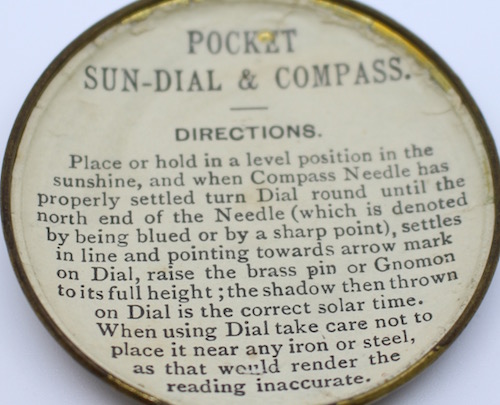| This is an extremely rare example and unusual antique pocket sundial and compass. It is marked TEMPUS FUGIT, which means "Time Flies" in Latin. This expression was very common on clocks in the 1800s. I would date this compass to late 1800 or early 1900. The heavy brass case has a nice old patina and a strong hinge. It has no dings or dents. Only some marks due to age that can be cleaned off but I prefer to keep it as it is. When the lid is open it reveals a nice compass with a gnomon that can be rotated in all directions. Inside the front lid there is a paper sticker with original instructions on how to use the sundial to read solar time. It reads: POCKET SUN-DIAL & COMPASS DIRECTIONS Place or hold in a level position in the sunshine, and when the Compass Needle has properly settled turn Dial round until the north end of the Needle (which is denoted by being blued or by sharp point), settles in line and pointing towards arrow mark on Dial, raise the brass pin or Gnomon to its full height; the shadow then thrown on Dial is the correct solar time. When using Dial take care not to place it near any iron or steel, as that would render the reading inaccurate. The case opens and closes as it should. The dial seems to be silver but I cannot be positive. It has Roman numerals divided to 15 minutes intervals. The compass is very precise and points North. There is a very slight bruise to the glass of the compass at the extreme edge but not that visible. The sundial measures approx 45mm in diameter and the compass measures approx 15mm in diameter. The brass case measures approx 53mm in diameter and approx 15m in depth. |

